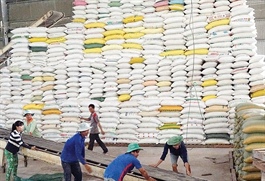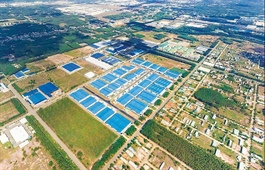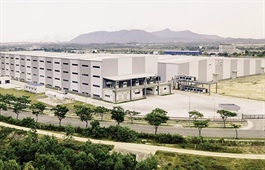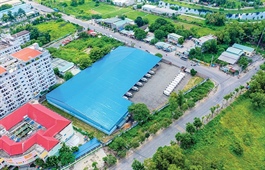Origin fraud threatens local exporters
Origin fraud threatens local exporters
After a local silk importer was recently found to be disguising Chinese products as Vietnamese to sell them in India, experts have warned of the risks of losing out on exports and preferential tariffs due to intellectual property (IP) violations.

The Department of Post-Customs Clearance Inspection from the General Department of Customs revealed that it had recently discovered a company in HCM City using its certificate of origin (C/O) to pass off Chinese silk products as Vietnamese and export them to India.
Customs officials said the firm imported finished silk from China to Cat Lai port in HCM City, then labelled them as 'Made in Viet Nam' in a local warehouse.
Customs officials deemed the move tax evasion as silk exported from Viet Nam to India are only taxed at 5 per cent, while products shipped from China have a tax rate five times higher.
Each year India imports from 2,200 to 2,500 tonnes of silk from China with a value of US$750 million to $800 million. According to an India market insider, the Indian Khadi and Village Industries Commission (KVIC), the Karnataka State government and the Silk Association of India (SAI) recommended banning silk imports from China to support domestic producers, which should help Vietnamese silk enterprises gain a stronger foothold in the Indian market.
However, the insider told a Vietnamese newspaper: “Such a case has swept the hope further away.”
“It is also a sign that some Chinese silk exporters have taken advantage of the lower tax position of Viet Nam to export their products,” he added.
Deputy director of the Trade Remedies Authority of Viet Nam under the Ministry of Industry and Trade (MoIT) said: “If Viet Nam does not take active measures to deal with the problem of evading trade remedies, especially through origin fraud, those activities will affect businesses and industries first. In the long run, it will have a negative impact on the competitiveness of the whole economy, especially in the context of joining a series of high-demand free trade agreements (FTAs)."
The problem doesn't lie with silk products alone and from the beginning of the year, customs officials have uncovered at least 77 cases where they discovered 24 violations of origin in exporting. Customs said bicycles, solar batteries and wooden items accounted for the majority of cases.
The trade remedies authority said origin frauds have a great impact on trade defence lawsuits. In the first eight months of 2020, Vietnamese exporters faced 27 investigations for fraud of origin, greater than the figure for the entire of 2019.
Nguyen Thuy Duong, a lawyer from the Ha Noi Law University said: “The risk of evading trade remedies and origin fraud has been increasing, especially in the context of the escalating US-China trade conflict and Viet Nam participates in many new FTAs such as the comprehensive and progressive Trans-Pacific Partnership Trade Agreement (CPTPP) or the Europe-Viet Nam Free Trade Agreement (EVFTA).”
To make matters worse, regulations for dealing with origin fraud and illegal transhipment are not very strong. For example, the firm that evaded tax when exporting the Chinese silk only faced an administrative sanction of VND60 million ($2,588) and another VND550 million of illegal profit (it is the profit they gained from the Chinese exporter) for the trading.
Lawyer Duong said when origin fraud helps violators enjoy tax incentives, countries suffer losses in tax revenues, affecting domestic industries and reducing the benefits of joining FTAs.
“If there is a suspicion of fraud or inaccuracy of the C / O issuance, in the CPTPP for example, if the importing country discovers a series of similar acts by the exporter or the manufacturer regarding fraud or counterfeiting of goods to enjoy preferential tax, they may decide to stop granting tax incentives for similar goods until it is proven those goods meet preferential conditions," he added
To deal with the problem, Nguyen Cam Trang, deputy head of the Import-Export Department, MoIT said: “Together with more investigations and checking products and export activities, we are educating and providing information to local enterprises, warning them not to join hand with foreign exporters (to commit fraud).”
Recently, the Trade Remedies Authority built an early warning system for many industries and products at risk of being sued for trade remedies.
The customs officials considered it necessary to add regulations on calculating illegal profits for local firms which outsource some of the work to help foreign exporters take advantage of tax incentives.
Customs also said the MoIT needed to have specific guidance documents on all relating C/O activities for products with labels 'Made in Viet Nam' so that they could investigate fraud more easily.


























